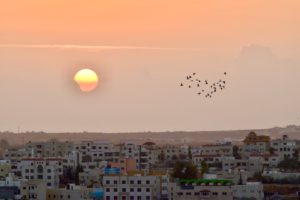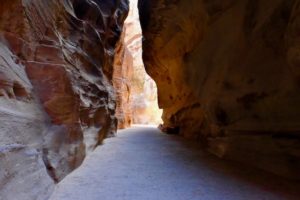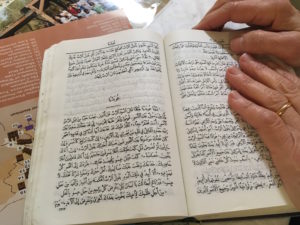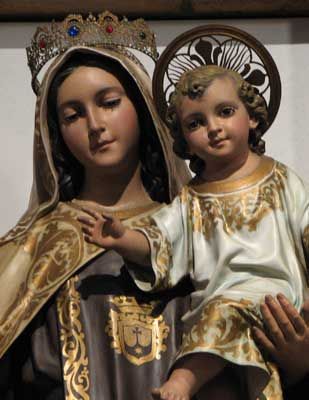
(Repost from December 2018)
When I got home from our Holy Land pilgrimage, one of the first things I did was call Asima, a seventy-something year old Arab who was once one of my best friends. I meant to call her before the pilgrimage to let her know that I would be visiting her homeland, but for some reason, I didn’t. I was hoping that calling her soon after the trip would suffice.
“So what is the news?” she asked, since I had rarely spoken to her since she moved out of the neighborhood five years ago.
“Asima, I visited Jordan!” I replied with excitement.
But rather than responding with joy, she asked with hurt in her voice, “Why didn’t you tell me?! Hmm?…I lived in Jordan. My daughter lives in Jordan. Hmm…Did you forget? Did you forget?!”
Asima was born in Jaffa Tel Aviv when it was called Palestine, but in 1948, when Israel was established as a state, she and her family, along with countless Palestinians, were forced to leave their homes and lands behind, and they moved to Jordan. She eventually came to the United States with her two unmarried sons due to the persecution of Christians.
We had a hidden friendship, one that was shared and experienced by just the two of us, and it began when she started taking care of my three-year old daughter. I belonged to an inter-denominational Women’s Bible Study that met weekly with the goal of going through all the books of the Old Testament in seven years.
About four years into our study, I could feel the exhaustion of motherhood and being away from my extended family weighing on me, and I turned to Asima for help. She led the Evening Women’s Bible Study for a small group of Arab women, but during the day, she took care of her grandson and helped with childcare at the church. Providentially, she also lived in an apartment just two blocks from our house and the grandson she was taking care of was the same age as my daughter.
I would try to simply drop off my daughter, but true to Arabian hospitality, Asima would not let me leave unless I sat down with her and had tea and anise cookies, or pita and hummus sprinkled with olive oil.
(“We are a people of the desert,” our tour guide from Jordan once said. “You cannot enter a home without being offered everything that we are able to give you. That is our way.”)
And we could not sit down at the kitchen table without Asima talking about the way of Jesus and the Prophets, as they moved through her homeland, a terrain that was so unimaginable to me, but one that Asima knew through the many generations of blood and family before her who lived there.
Soon, she was also giving me extemporaneous Bible Study lessons when she passed by my house and found that I was home.
I would come along on her leisurely walk around the block and together we would talk about scripture, rescue lemons fallen from bushes, and pick apricots from the tree on the side of my yard. In early spring, she would come with scissors to cut the young grape leaves off our terrace.
In exchange for the harvest from our yard, Asima would return a few days later with dolmas made of grape leaves, tabouli sprinkled generously with lemon juice, or a small jar of apricot jam.
“Asima, I didn’t forget you. I thought about you the whole time I was in the Holy Land,” I tried to explain to her. Every bite of hummus, the scent of anise and sesame seeds, and parsley and lemon that pervaded the places we ate in –constantly reminded me of her.
And everywhere we went, I heard her voice, telling different stories from both the Old and New Testament.

When we walked through Petra, the majestic city built in the red stone cliffs of Jordan by the Edomites, I heard Asima speaking. “Did you read the book of Obadiah? It’s only one chapter from the Old Testament. Obadiah spoke about Petra. The people who live in Petra, they were very proud because they are living inside the high mountains, and when the enemy comes, they must walk the narrow way. When the people of Petra see men coming to fight, what do they do? They attack from the top of the mountains.
‘And who lived there before? Esau’s children. His brother is Jacob. Jacob used to live on the Palestine side, and Esau lived in the Jordan side. When the enemy comes to fight Jacob’s children, they asked Esau’s children if they can come around to their side, but they refused. They started to laugh. For this reason, Esau’s children do not get blessed by God.’
“Go to Obadiah verses two and eighteen. Read it.” I would then leaf through the Bible and find the scripture passage as fast as I could, while Asima would almost immediately open to the page. While I read, she ran her finger from right to left on her bible’s Arabic script.
“Now I make you least among the nations; you are utterly contemptible. The pride of your heart has deceived you – you who dwell in mountain crevices, in your lofty home…The house of Jacob will be a fire, the house of Joseph a flame, and the house of Esau a stubble…none will survive of the house of Esau, for the Lord has spoken,” I would read.
“You see,” she would exclaim. “To this day, Petra is empty except for tourists.”

She would then share modern-day stories, those shared by word of mouth from one friend to another about the wars in Iraq, Afghanistan, and Syria; the stories sounded too barbaric and unreal to me then, but they have today, become an accepted part of the news.
“But God is perfect and knows all. Jesus was born at exactly the right time. Go to Galatians, chapter 4, starting at verse three. What does Paul say?”
I would read, “But when the fullness of time had come, God sent his Son, born of a woman, born under the law, to ransom those under the law, so that we might receive adoption. As proof that you are children, God sent the spirit of his Son into our hearts, crying out, “Abba! Father!”
“Why does Paul say ‘the fullness of time?’ After the Greek empire, the Romans came. And after the Romans came, they couldn’t change the language. The Greek language spread. And what did the Romans do? They fixed the roads. ‘All roads go to Rome!’
‘Now look how God prepared the way. One language, and Paul knows the language. He speaks Greek, and he’s educated. He has a Roman passport, and the roads are open. Yanni, it helps Paul to go every place to talk about Jesus. For this reason, it says ‘the fullness of time.’”
Asima was one of the first people to visit me when my youngest child was born. She would smile at the baby in her arms, and fondly say, “Habibi!” Then she would sing to him, “My God is so big, so strong and so mighty, there’s nothing my God cannot do!”
Our times together dwindled when I had to return to work to support my husband through graduate school and my children through several private schools. The endless weekends of grading papers and prepping, and all the demands of being a mother of four children while working full-time, made times with Asima less possible, and it began to seem that the friendship was really not so important.
But everything about Asima and the intimacy of our friendship came rushing back at me when we visited the Holy Lands. It wasn’t just the smells, the landscape, and the sound of her voice telling a story behind every holy site – our tour guide in Israel even ended up being part of her extended family!
(“Oh, I know Asima,” he nonchalantly told me. Then he pulled up a photo of a relative Asima introduced me to fifteen years ago, and his baby).
The Holy Spirit was constantly prompting me to remember because He didn’t want me to forget who Asima was to me — for Asima reminded me of who I was before the Lord.
“You are like my other daughter,” she would often tell me with gleam in her eyes. “And you are also God’s daughter. For this reason, always, you are beautiful. He loves you so much — He knows the number of the hairs on your head.”
I didn’t so much forget Asima, as much as I had forgotten who I was.
ADVENT PRAYER
O Mary, my Mother, be my model during this holy season. Christ was alive within thee during the first Advent. We want Him to be more alive within us than ever during this Advent. May we not merely possess our precious Catholic Faith-rather, may It take complete possession of us, so that wherever we go, whatever we do or say, it will be the Christ Child that inspires us.


Lovely story, makes you think deeply…. about God, friends that bring you closer to God..and not forgetting those friends.. how everything is of God… every big thing and little thing..
I’m so thankful that you got so much out of this little story, Patricia. – TL